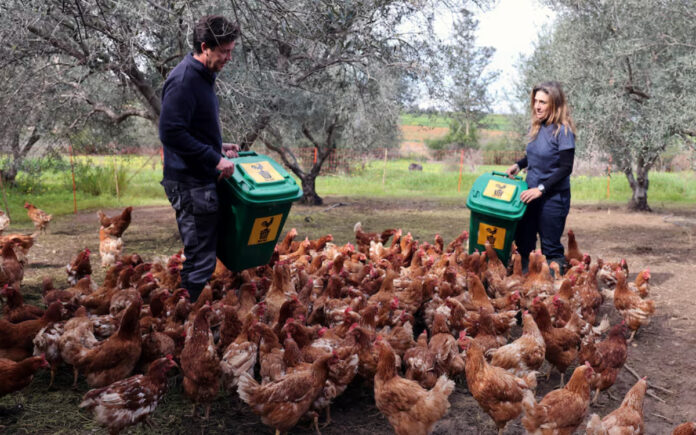Akaki: Organic farmers in Cyprus are giving retired hens a second chance at life while revitalizing olive groves through an innovative project that boosts yields, combats disease, and helps reduce food waste.
At the organically certified Akaki Grove, nestled in the foothills of the Troodos mountains west of Nicosia, hundreds of former egg-laying hens roam freely, pecking and fertilizing the land. Saved from slaughter after their egg production declines, these hens play a crucial role in enhancing soil health and olive tree productivity.
The initiative, known as the Kot-Kot Project, is the brainchild of farmer and grove owner Elena Christoforos and soil engineer Nicolas Netien. By collecting food waste donations to feed the hens, the project creates a sustainable cycle where the chickens not only receive nourishment but also contribute to the soil’s natural enrichment, leading to the production of high-polyphenol olive oil, known for its anti-inflammatory properties.
“We provide them with an old hens’ home, they come here and retire,” said Christoforos, standing among the clucking birds as she emptied bins of donated food scraps from schoolchildren.
Beyond fertilization, the hens serve another vital function: pest control. By pecking at larvae, they help reduce the population of the olive fly, a persistent pest that plagues Mediterranean olive farmers. They also clear surface weeds, naturally maintaining the groves without the need for herbicides.
Additionally, feeding the hens with food waste minimizes organic matter sent to landfills, reducing methane emissions—a major contributor to climate change. Unlike conventional poultry farming, where hens are culled after just a couple of years, these birds enjoy a long and peaceful retirement, often living for 8 to 10 years.
Building a Resilient Ecosystem
The project aligns with a broader vision of sustainable agriculture. Netien, who holds the world record for producing olive oil with the highest polyphenol content, emphasized the ecological benefits of integrating livestock into organic farming.
“The goal here is to create a biodiverse, self-sustained ecosystem that can withstand extreme temperatures and prolonged droughts. By bringing animals into the system, they consume ground cover and enrich the soil through their natural processes, accelerating the nutrient cycle,” Netien explained.
Also Read | Apple’s $500 Billion U.S. Investment Signals Major AI and Tech Growth
Since the hens were introduced, olive tree growth and yields have shown remarkable improvement, further demonstrating how regenerative farming methods can enhance both productivity and environmental sustainability.
Also Read | Roberta Flack, Grammy-Winning Singer, Dies at 88
This pioneering approach not only preserves traditional olive cultivation but also sets an example for sustainable agriculture worldwide—where animals, plants, and human efforts work in harmony to restore the land.



